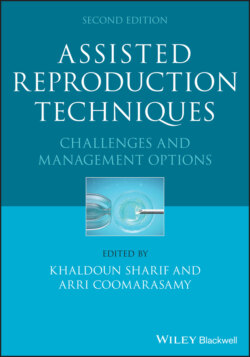Читать книгу Assisted Reproduction Techniques - Группа авторов - Страница 39
Answers to questions patients ask
Оглавление1 Q1 Do sperm cells carry HIV? A1. HIV infection can be transmitted through semen since the virus is found in HIV‐infected white blood cells and may also be free‐floating in the seminal fluid. Sperm cells lack the receptors to bind the virus and allow infection to occur. Isolating the sperm cells from the seminal fluid through “sperm washing” essentially eliminates the risk of transmitting the infection which is the basis for all the various reproductive therapies offered.
2 Q2 Does HIV infection affect male fertility? A2. Men who are HIV‐seropositive have been shown to have higher risk for abnormalities in their semen analysis including lower sperm counts, reduced sperm motility, reduced fertilization potential and lower ejaculatory volumes, all of which may impair natural fertility. Many men with HIV also demonstrate lower serum testosterone levels which may impact both the semen analysis and their libido. Drug treatment for HIV may also adversely affect spermatogenesis and further lower natural fertility.
3 Q3 Is it safe for my HIV‐seronegative female partner to have a baby with me if I am HIV‐seropositive? A3. The risk of transmission is believed to be negligible when men are fully compliant with HAART, demonstrate undetectable viral loads (VL) in their blood tests, have no other associated sexually transmitted diseases and limit unprotected intercourse to the time of ovulation. Sperm washing techniques are necessary when the VL is detectable or in cases where males are noncompliant with medications. Sperm washing prior to IUI or IVF is routinely offered to serodiscordant couples as a further safeguard.
4 Q4 Can you guarantee my partner will not become infected while trying to become pregnant using washed sperm techniques? A4. Although well‐performed sperm washing techniques appear to greatly reduce the risk of infection, there are no 100% risk free methods for assisting HIV‐seronegative women to conceive with HIV‐seropositive males. Partners should obtain maximal viral suppression before attempting pregnancy regardless of the method chosen for treatment to minimize risk to the uninfected partner. Use of donor sperm from an uninfected male is commonly recommended in order to eliminate the risk of HIV transmission entirely but precludes the male partner from genetic parentage.
5 Q5 Do I need to have my semen frozen and tested for HIV in order undergo fertility treatment? A5. Viral testing of semen has been commonly performed in men interested in fertility treatment and has often been used in the past to triage fertility care. However, individual sperm cells cannot be assessed and are unlikely to harbor the virus. Most HIV‐positive results in semen are associated with detectable VL in the blood and are likely a result of free virus and leukocytes associated with virus found in their semen. Performing viral testing of an aliquot of semen prior to it being frozen and later processed for clinical use adds expense and is of questionable necessity. However, patients wishing to have viral testing of their semen may be accommodated by labs licensed to provide this service. Men compliant with HAART demonstrating undetectable VL in their blood have negligible risk of transmitting infection and therefore do not need to undergo testing of their semen.
